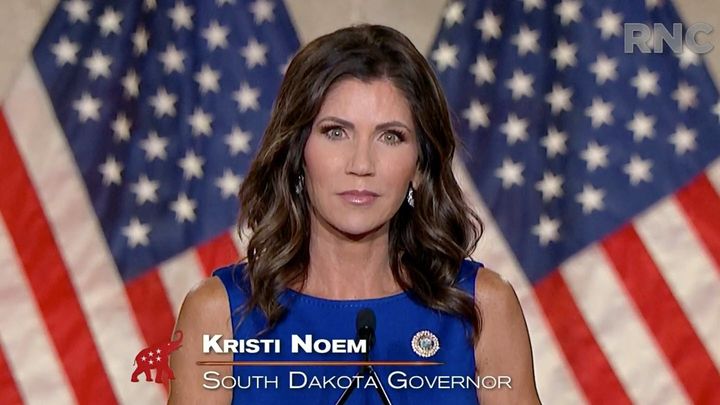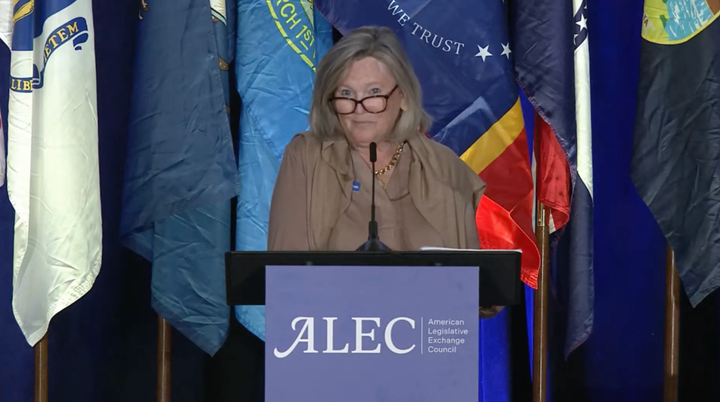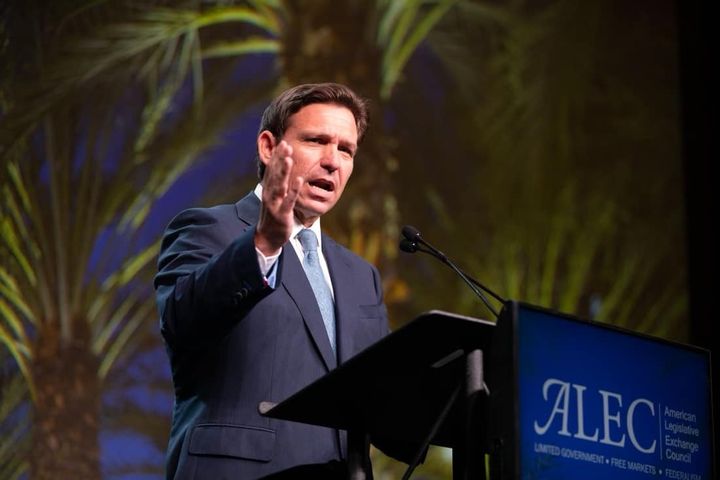UPDATE: This bill was signed into law by Noem on March 3, 2021.
South Dakota Gov. Kristi Noem has made headlines lately for allegedly misusing taxpayer dollars by using the state plane to travel to right-wing political events held by groups like the National Rifle Association and Turning Point USA. But while much of the state’s attention on Noem turns to that scandal, she is quietly in the final stretches of a legislative push that watchdog groups say could protect dark money forces in South Dakota elections.
Noem, who is up for re-election in 2022, is behind a bill making its way through the legislature that would prohibit the Board of Elections and other state agencies from requiring nonprofits or charities, including those that spend money on politics, to disclosures that are “more stringent, restrictive, or expansive” than what is required by state or federal law. Nonprofits are not required to report their donors publicly or to the federal government.
The bill passed the Assembly on Feb. 3, 62-8, and passed the Senate on Feb. 16, with a minor amendment, by a vote of 32-2. The amended version is now awaiting another vote from the House.
Noem has defended the bill as an attempt to protect the privacy of charitable donors, telling reporters earlier this month that it “does absolutely nothing on campaign finance.”
But campaign finance law experts say that’s not true.
“If enacted, this bill could help shield the donors behind dark money groups active in state politics from scrutiny by state regulators,” Issue One Research Director Michael Beckel told Sludge.
Since the Supreme Court issued its Citizens United ruling in 2010, an increasingly large number of groups and individuals have formed organizations under the Internal Revenue Service’s 501(c)(4) designation, allowing them to make independent expenditures in elections without having to disclose their donors as is required for PACs and 527s organizations. Nonprofit (c)(4) groups are supposed to focus primarily on “social welfare,” not politics, but that requirement would be more difficult to enforce under this bill.
“State agencies seeking to investigate politically active dark money groups would have less information available about such groups if there is no reporting of these groups’ donors to the state,” Beckel said. “Without being able to see the money flowing into these groups, it could be harder for investigators to connect the dots or to see the networks of wealthy individuals and special interests pumping cash into these groups.”
All of the Democrats in South Dakota’s House of Representatives and Senate voted against the bill, while all of the Republicans voted in favor. Some former Republican officeholders in the state, however, are not siding with Noem on this measure.
“House Bill 1079 is a bad bill, intended to deny citizens information to which they are entitled,” South Dakota Republican Senator Don Frankenfeld told Sludge. “Democracy works best when its citizens are well informed. A law that fosters ignorance is a bad idea, and a violation of conservative principles.”
A related measure originating in the state Senate is also being advanced. Senator Casey Crabtree, who was appointed to the Senate by Noem in 2020, introduced a bill declaring that “any natural person who supports a nonprofit corporation has a right to personal privacy” and prohibiting state agencies from compelling nonprofits to identify their donors. That bill passed the Senate earlier this week and is now pending in the House of Representatives.
In 2019, Noem’s campaign committee chair and the former treasurer of her leadership PAC when she was a member of Congress, Bluestem Capital founding partner Steve Kirby, formed a 501(c)(4) nonprofit called Fight For Our Future. Kirby is no longer affiliated with the group, Noem told the AP, but current members of the Fight For Our Future board of directors include Suzanne Veenis, a former Sioux Falls office staffer for Noem, and Brian Prouty, who Noem’s husband recently tagged in a Facebook push-up challenge meant to raise awareness of veteran suicides.
It’s uncertain if Fight For Our Future is planning to spend dark money to back Noem (next to nothing is known about the group), but it wouldn’t be unprecedented. Noem’s first election campaign for governor was bolstered by independent expenditures by a super PAC that received $95,000 from an affiliated dark money nonprofit. Other donors to that super PAC include Kirby, who chipped in $10,000.
South Dakota’s voters have already demonstrated that they want to end dark money in politics. In 2016, voters passed a ballot measure that called for the identity of donors who give more than $100 to organizations for the purpose of political expenditures to be reported to the secretary of state. The measure, which also included campaign finance and ethics reforms, was approved by 51.6% of voters, but it was repealed by the legislature in 2017 under an emergency measure that denied voters a veto referendum on the bill overturning the repeal.
Noem’s bill is part of a trend that extends beyond South Dakota. States including Oklahoma, Arizona, Mississippi, Utah, and West Virginia have all passed legislation to shield nonprofit donors from state and local officials in the past few years. The bills broadly follow model legislation on donor privacy that was promoted by the influential conservative nonprofit the American Legislative Exchange Council (ALEC). Noem is a former ALEC member and was given a 5-star ranking in the group’s 2020 Laffer-ALEC report on Economic Freedom. The report highlights Noem as one of a handful of governors who achieved “considerable success in protecting their economies from unemployment increases and other aspects of economic devastation” during the coronavirus pandemic, while South Dakota has the eighth highest per capita death toll from Covid-19.
The United States Supreme Court recently agreed to hear an appeal by conservative catholic group the Thomas Moore Law Center and the Charles Koch-founded political advocacy group Americans for Prosperity against a lower court ruling that determined California’s attorney general could require them to provide details of their donors. The case, which has been playing out since 2016, stems from an attempt by then-California Attorney General Kamala Harris’ to require Americans for Prosperity Foundation to furnish a donor list and is seen as a referendum on whether states can force transparency upon politically active nonprofits.
A Fix for Democracy – Following the Supreme Court’s 2010 decision in Citizens United, which banned limits on political spending by corporations, unions, and other groups, “dark money” has dramatically increased in state elections. To help voters understand who is funding campaigns and political ads, states can pass laws that require all groups who spend money on politics, including LLCs and nonprofits, to disclose the original source of their funding. Learn more—>
Read more from Sludge:



